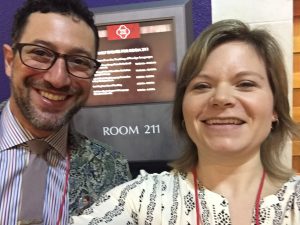Lessons from ACTFL ’14: if they have all the answers, they’re trying to sell you something
 My first trip to the annual convention of the American Council on the Teaching of Foreign Languages was amazing. Well, there was the thing where I didn’t have any kids with me for a few days. I adore my children, but a few days off was much needed!
My first trip to the annual convention of the American Council on the Teaching of Foreign Languages was amazing. Well, there was the thing where I didn’t have any kids with me for a few days. I adore my children, but a few days off was much needed!
Honestly, I didn’t get to attend many sessions; in fact, I wasn’t able to sit through one from beginning to end. I was involved in three sessions myself, and I spent some time representing Calico Spanish in the exhibit hall, and I spent a huge amount of time just sitting (or really, standing) in various places having conversations with people who continually inspire me: from Helena Curtain to leaders at CASLS, Noah Geisel to Mira Canion, blogging wonders like Laura Sexton (SraSpanglish), Bethanie Carlson-Drew (Aventuras Nuevas), Colleen Lee-Hayes (Language Sensei), and Kara Parker (Creative Language Class). Erica, Andrea, Kris, Caleb, Julie, María, Cheryl, Don, Meriwynn, Marcela, and so many more.
When I told Noah (Geisel, @SenorG, former ACTFL TOY), as I told almost everyone, that if I’d only been able to sit and have the face-to-face conversations I had with these amazing educators, the trip would have been completely worth it, he told me he calls them “couch conversations,” and that we all needed to blog them. Honestly, the sessions are great, but those of us who are spoiled by the weekly #langchat and its summaries, and the blog posts regularly delivered to our email, are rather used to being exposed to the kind of information and ideas given in the sessions. No, to me, it was the “couch conversations” that make ACTFL what it is.
So without further ado, here are some of the resources from the sessions I was able to attend, or heard about, or was involved in, as well as some lessons learned from the “couch conversations.”
Session resources
From the sessions I participated in:
#Langchat
You can find out so much about #langchat and its mission, purpose, function, past topics, summaries, social bookmarking, and more by visiting the #langchat wiki. Here are the slides from our presentation. (So yes! Join #langchat!) If you need to know whom to start following on Twitter, here’s my list of (now almost 800!) language teachers on Twitter.
Choice in homework
You can find all the best resources I have to offer you in the worthwhile journey to infuse more autonomy into homework in this popular post from August, Putting homework in their hands: Sample systems. You can get the handout and see the slides from this popular ACTFL presentation via a blog post from my co-presenter Bethanie.
Kick the vocab quiz
I was blown away by how many teachers were dedicated enough to stay for a 5:15 presentation on Saturday to rethink the ubiquitous vocabulary quiz.
My handout (well, digital offering, I don’t actually do handouts) is just a list of blog posts you will want to read if you’re interested in changing up how you assess vocabulary to foster and assess more long-term memory.
Many thanks to Cristina Zimmerman for posting her notes from the session via Evernote.
And here are the slides.
And now from a couple of other sessions:
Anytime you can catch a session by Greg Duncan you won’t regret it, and when I found out he was talking about motivation, one of the topics nearest and dearest to my heart, I knew I had to catch at least part of it! How many students your program retains into higher-level electives is a telling indicator of its overall health, and you can learn more about motivating students to continue to upper levels through his handouts on his wikispace.
I felt like Prince William himself had graced our homework presentation when I saw that Joe Dale was on the front row. As Noah said about Joe’s presentation on digital storytelling,
How I wish I had been there! I heard it was a lot better than the other digital storytelling session I did make it to.
Couch conversations
At Noah’s suggestion, I’ve been trying to distill all the amazing conversations from this week, to make some sense of the random but inspiring notions that filtered to me through the minds of so many empowered educators. I think I can summarize by offering some advice. I’ll try to word this very carefully so I can be honest and do justice to how much I respect the people who challenge me to be a better teacher.
In every field with this many people who are striving to be the best they can be and be as successful as they can be, conflict inevitably arises. We become convinced that our pet method is the one that works, that would work for everyone if only they would do it right. We may even start to think that if we were in that other teacher’s shoes, given the same students, we could handle them better and teach them more. We couldn’t be more wrong.
There are a few people who have a gift for asking (me) probing, disturbing questions without offering any answers. I hate it, because I think, I was comfortable doing this and thought it had to be the right way and then you made me consider how it might not be the best way after all! I love those people. I need them. I don’t always love their questions, but I need them, because in the struggle to find my own answers, I often find the ones that work for my students.
There are other people who have a gift for asking probing, disturbing questions, or listening to me ask them, and then offering a buffet of potential answers. Maybe a couple of these answers are the right one for me, and maybe none of them are, but the process of exploring them often leads me to something that works for my students.
Then there are others who listen to a question or ask a question and immediately have all the answers. And if you have any doubts, you’re simply wrong, or you’re not doing it correctly, or you’re not understanding correctly. But anyone who has all the answers is trying to sell you something. Not everyone who wants to sell you something thinks he has all the answers, but everyone who has all the answers is trying to sell you something, even if it’s that they are superior to you and your peers.
Honestly, there aren’t that many of that last kind of person. I think we think there are more than there really are, and I think it’s because we want so badly to find someone who has all the answers. We think,
just give me a formula to make this work. Just put the curriculum in my hands and the strategies to go with it and I will seriously pay you for it.
But it doesn’t work that way. You can sign up for the most inspiring workshop and buy a bunch of resource materials at a conference and bounce into your classroom ready to knock it out of the park, and it may still fall flat with your students. If you come to Camp Musicuentos next summer, you’ll probably greatly benefit from it, but I can’t promise to solve all your curriculum planning problems and take away the stress from your job now and forever. What you need to do is to look for people who will challenge you with provocative questions, help you evaluate your practices against research-based principles, and give you an encouraging smile and hug (even if it’s virtual) on the days when all the right answers turn out to be the wrong ones for that class on that day.
Believe in the dignity of autonomous hard work.
Don’t label yourself; embrace the individuality that makes you the best teacher for your students.
If you are being stifled from above, look for a way out.
Be willing to say you’re sorry.
Praise others for the work they’re doing to help students succeed.
Laugh, and have fun, and play.
What a great note on which to end my blogging year. Happy holiday season to you all.




